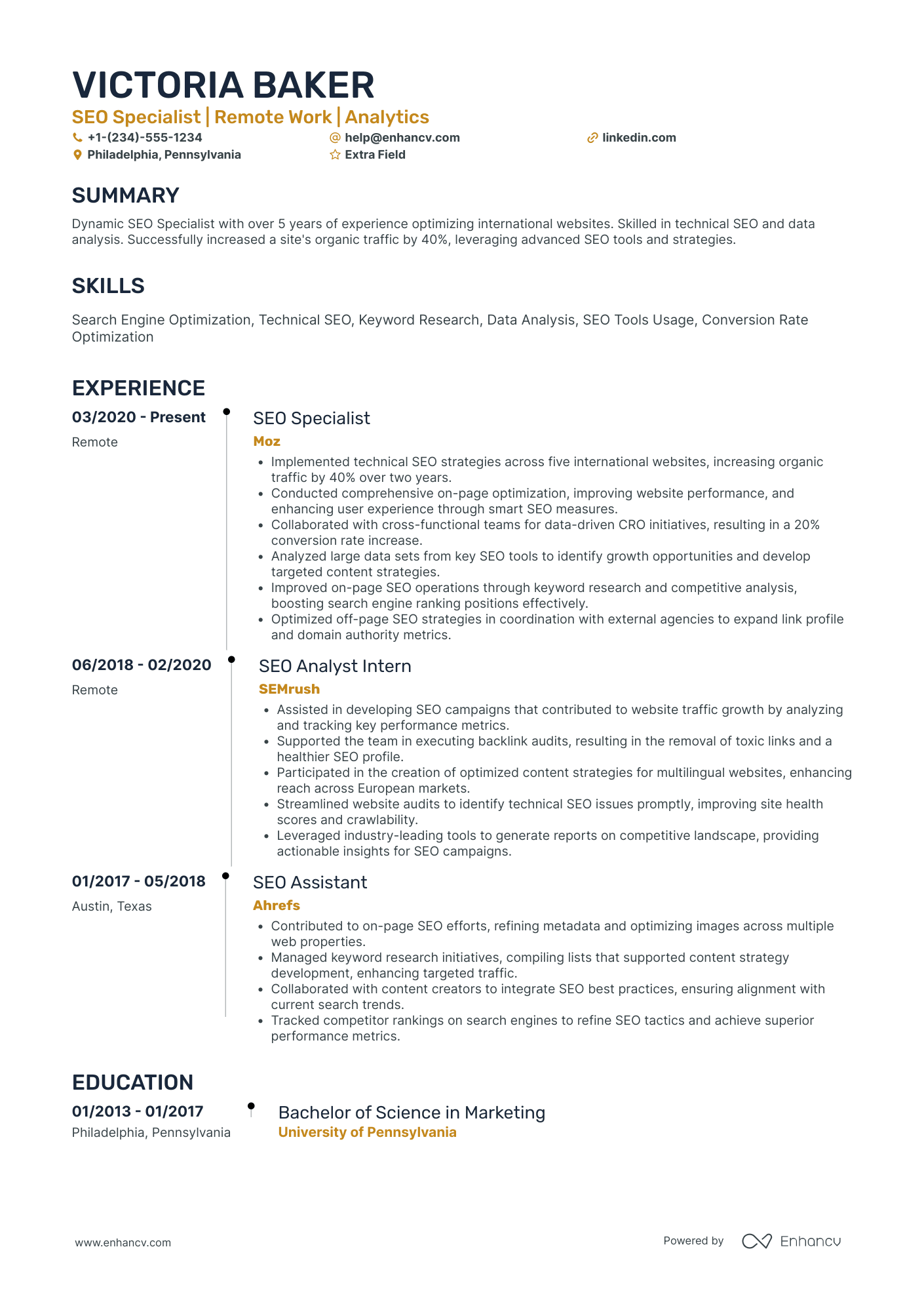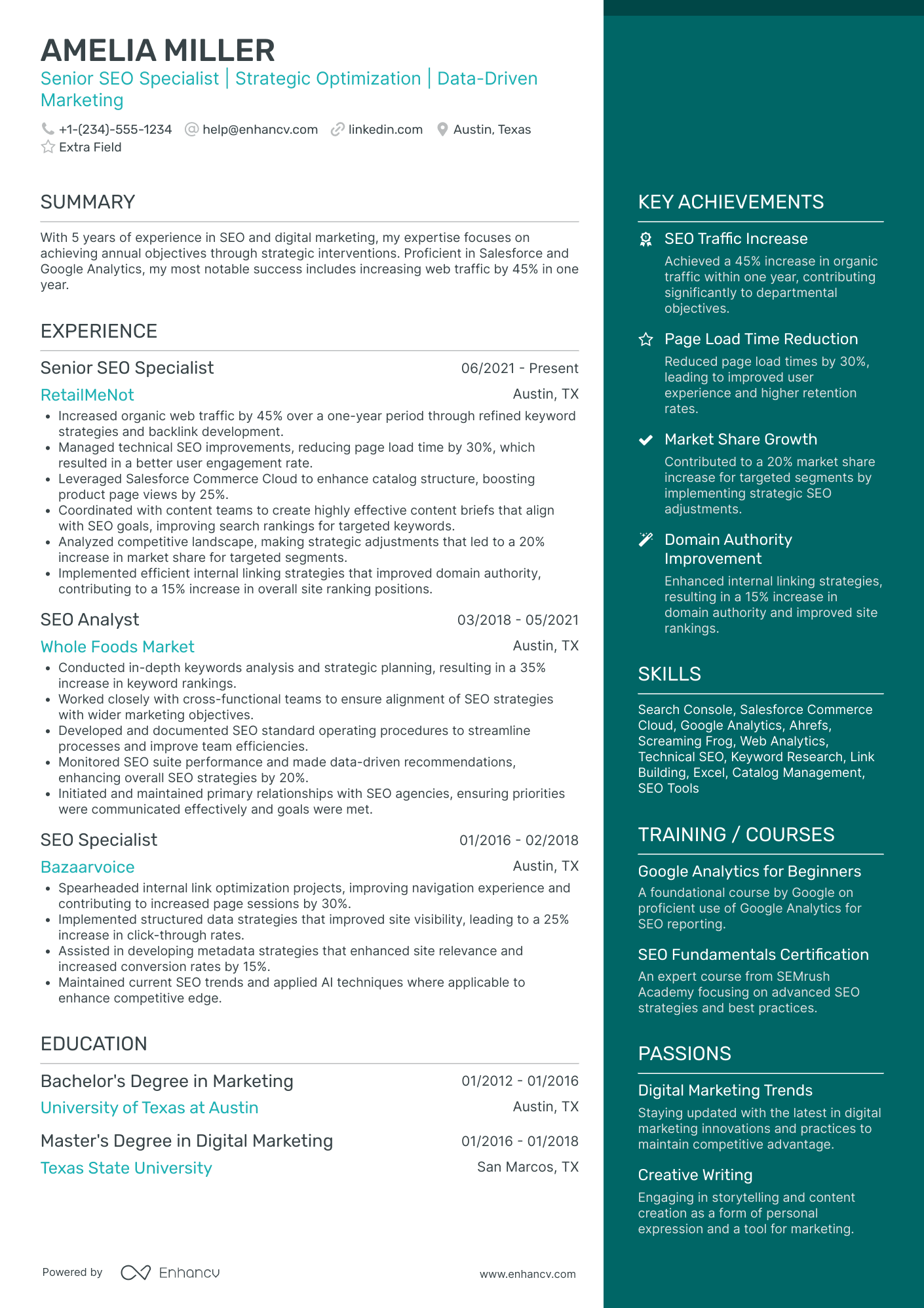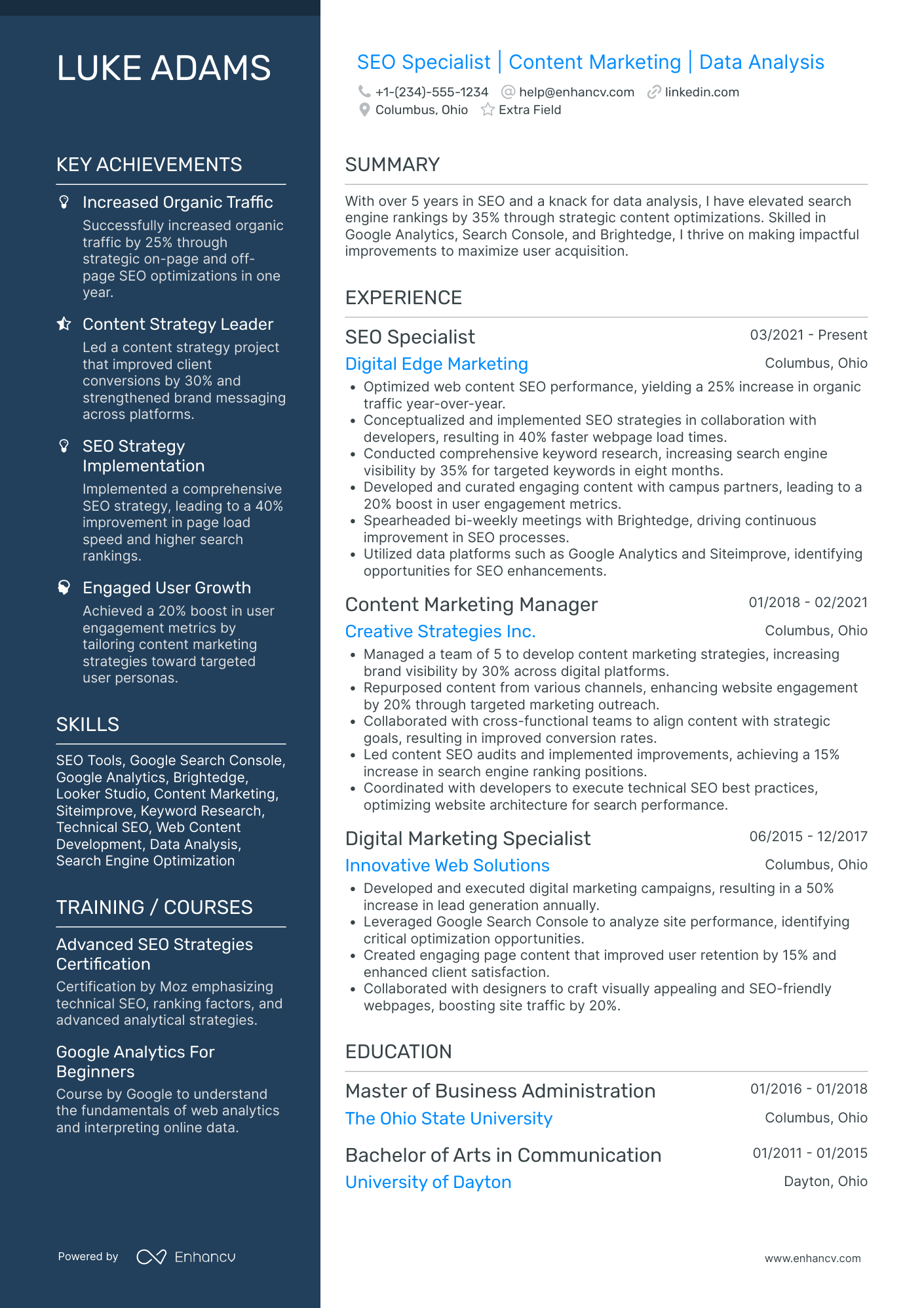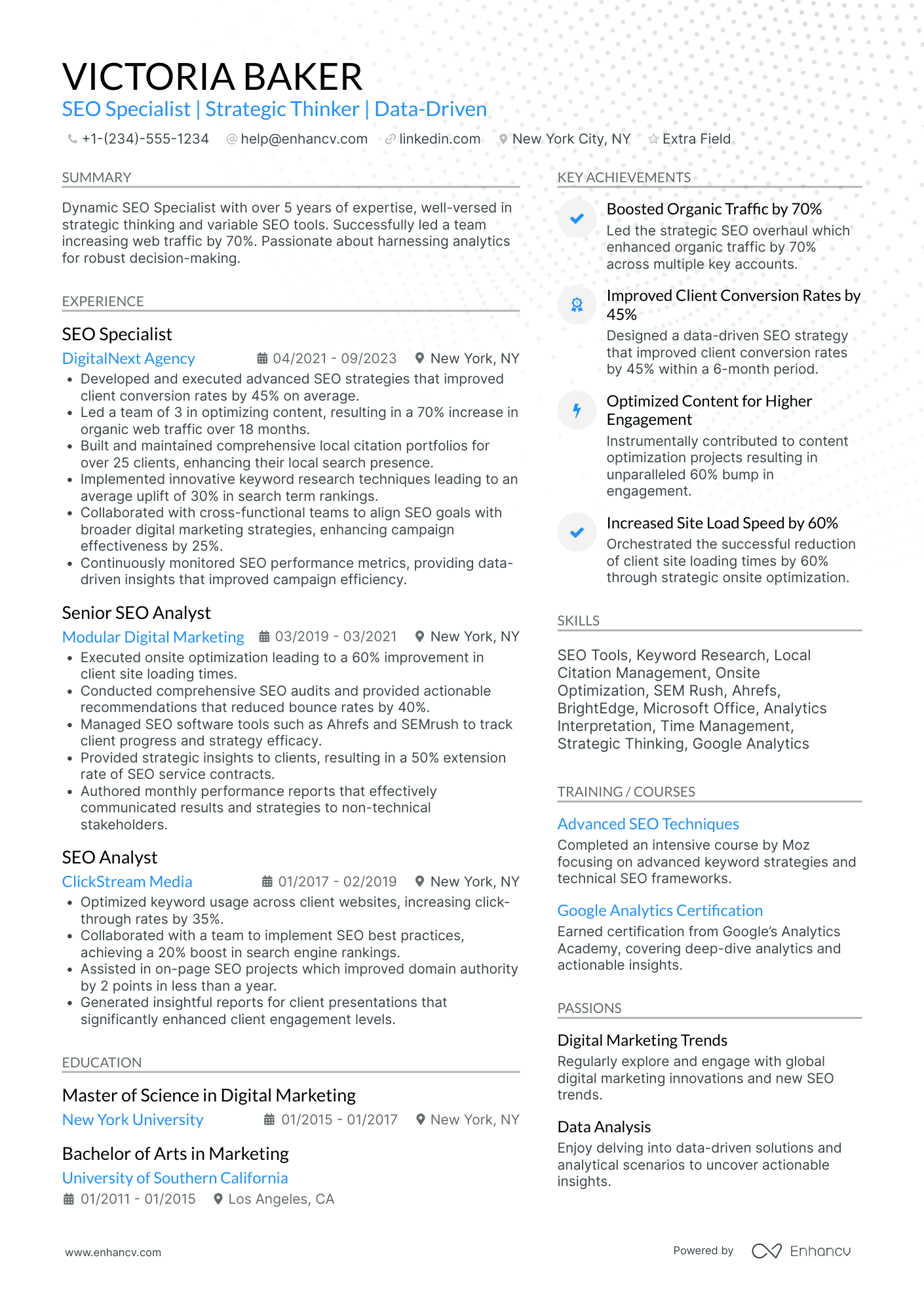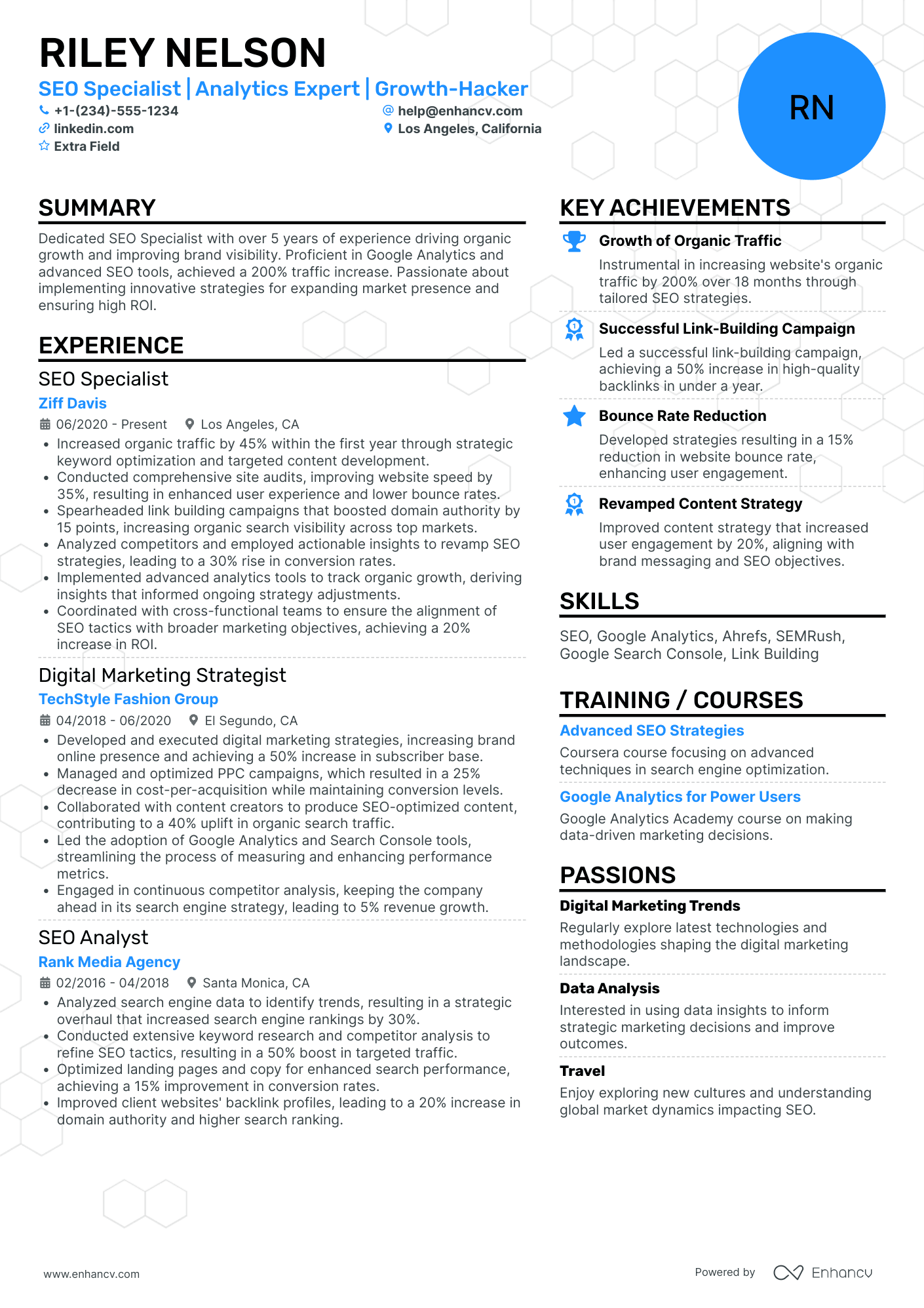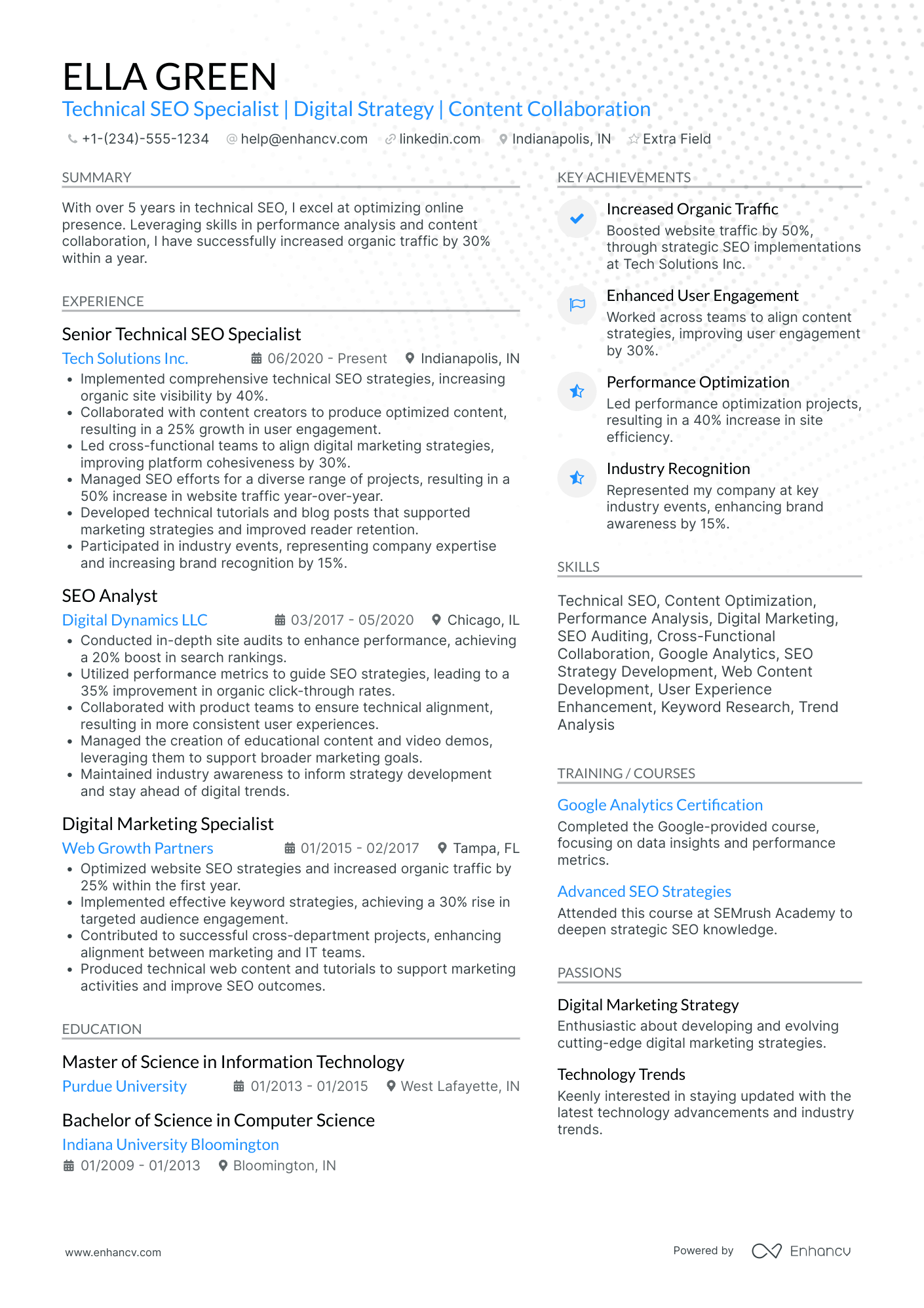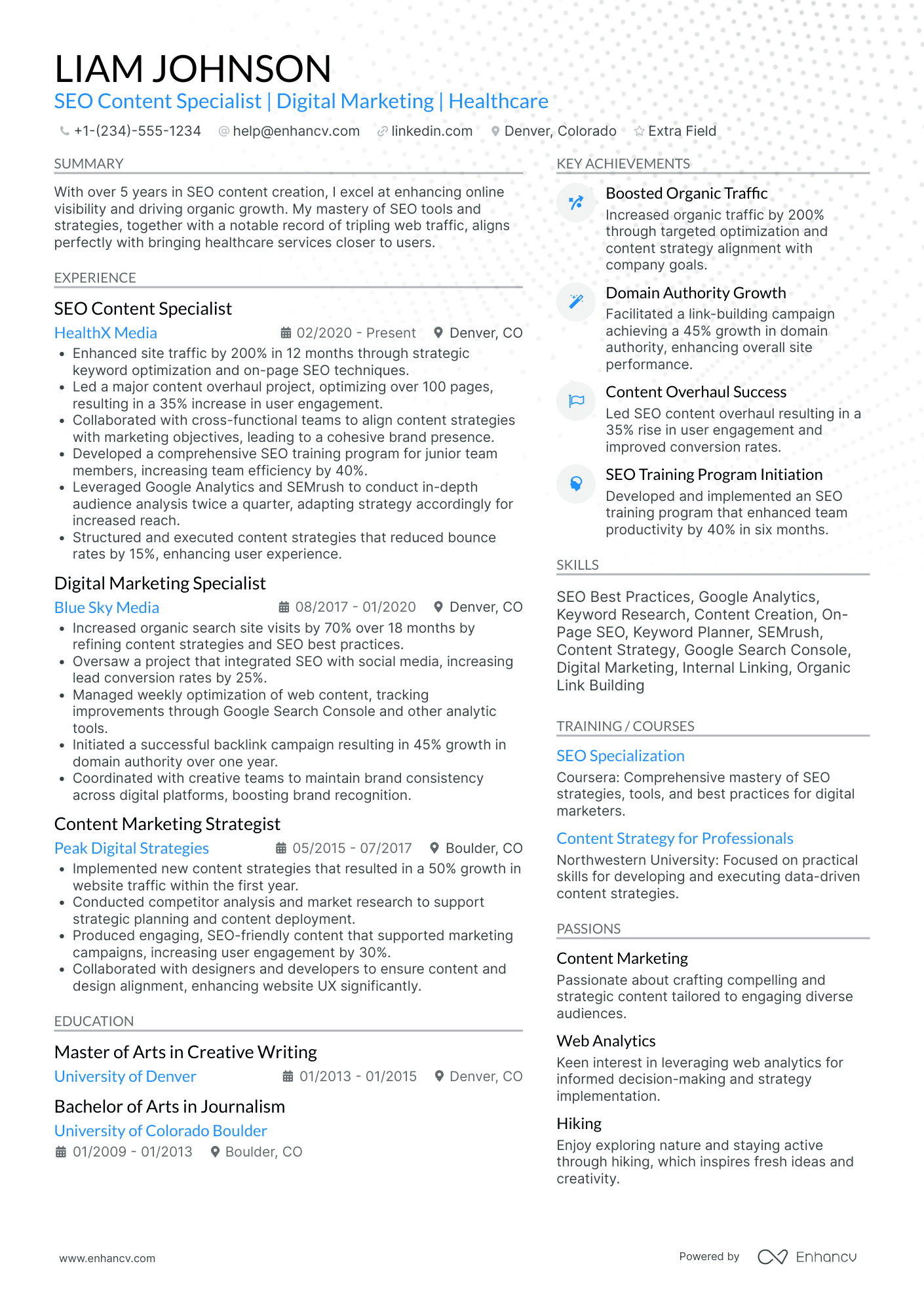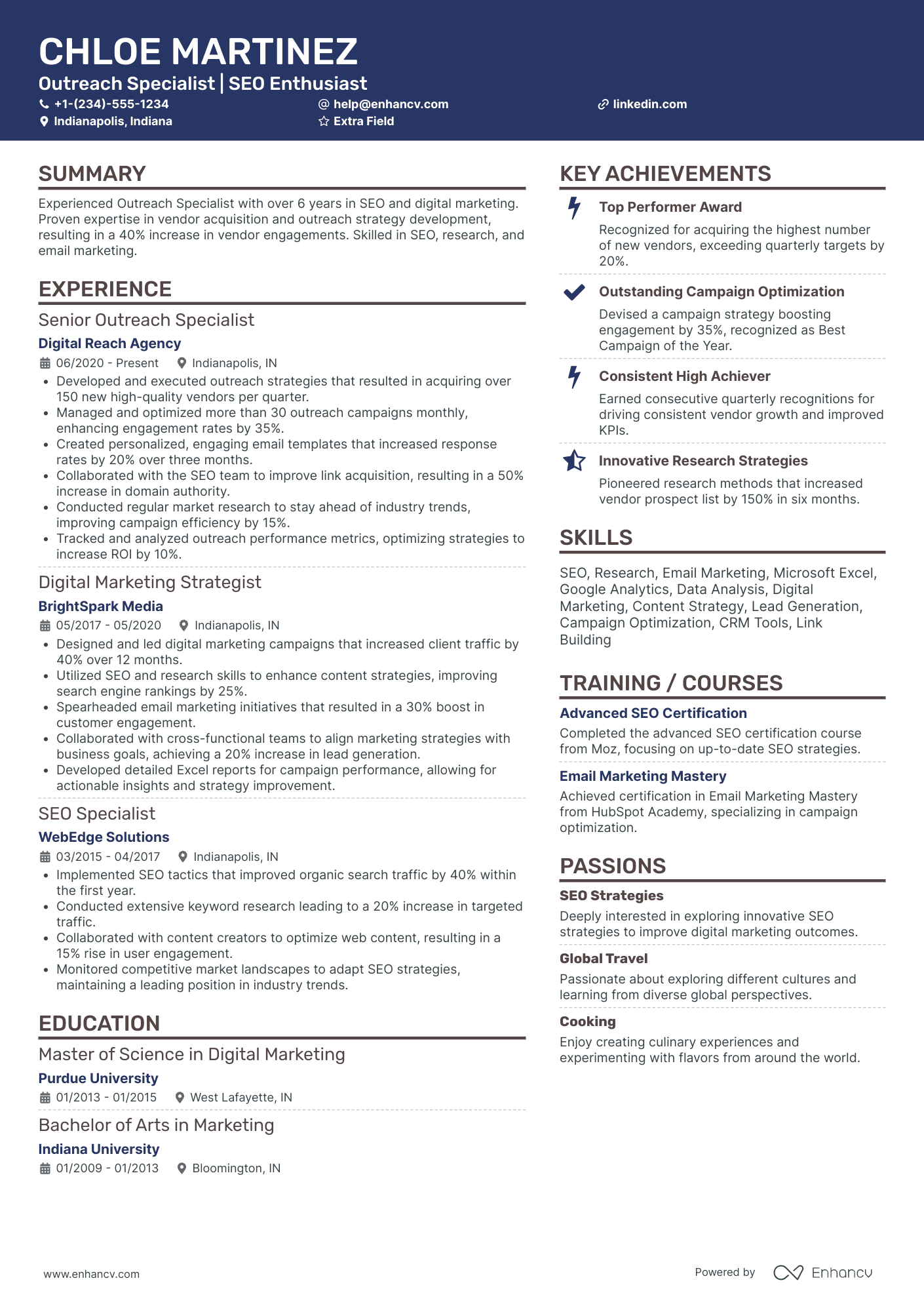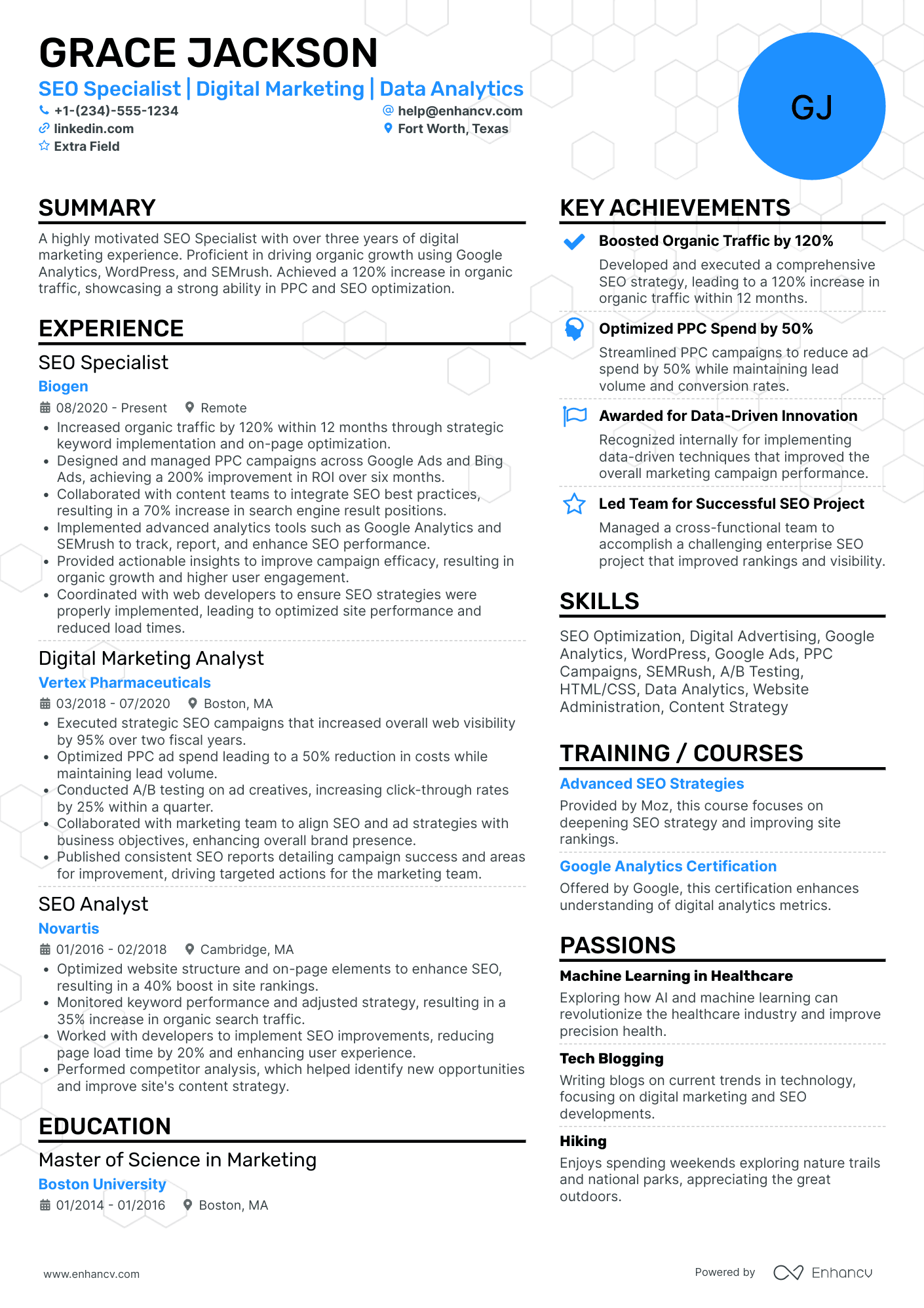Believe it or not, we’ve seen our fair share of crazies when it comes to SEO specialist resumes.
The one that we’ve printed on our wall of fame had a resume tile:
“SEO specialist resume, best SEO specialist resume, top SEO specialist resume, NYC SEO specialist, Boston..”
Imagine how the rest was.
And, it came from someone with a background of 2+ years as an SEO professional.
But, we know you are much smarter than that!
So, we collected what most usually known as the unspoken rules of resume writing and built this guide for you.
“The ideal SEO specialist is hungry to learn and provides creative solutions to unique problems. I’m less interested in someone with a degree in English or digital marketing and more keen on hiring a candidate who’s able to accurately represent their ambition and capabilities.”
Paris Childress, CEO & Founder of Hop Online
This SEO specialist resume guide will teach you:
- What resume layouts and sections are perfect for an SEO specialist.
- What your header needs to ensure your resume doesn’t go straight to the trash
- How to write an eye-catching summary.
- What kinds of skills make the greatest impact.
- What certifications to get and how to use them on your resume.
Looking for related resumes?
- SEO Resumes
- Content Marketing Resumes
- Ecommerce Marketing Resumes
- Copywriter Resumes
- Marketing Manager Resumes
- Marketing Resumes
How to write an SEO specialist resume
Well start from the very bottom and read how to write a resume in the first place, then proceed forward. Future employers are most interested in your current career and whether your experience is applicable to the job offer. Therefore, if you’ve been working in the SEO industry for a few years, our experts recommend writing your work experience in reverse-chronological order.
If you’ve got a wide breadth of experience from piecework, freelance gigs, as well as a regular 9-5, you might want to consider a hybrid resume. This sort of document allows you to highlight your skill sets while also incorporating your work experience.
The top sections to include on an SEO specialist resume
- An objective or summary
- SEO experience with a focus on results you’ve gotten
- Certification(s)
- Education
- Relevant soft and technical skills
Layout aside, you’ll also need to make your area of expertise clear. The hiring manager shouldn’t be reading your resume and wondering whether you do on page specialization or outreach.
Ultimately, a SEO specialist resume which is focused on a single area is going to be more effective than one with a bit of experience in 5 areas.
Pro tip
You’ve got less than 10 seconds to grab your audience’s attention – make sure that you’re providing the most accurate information as quickly as possible.
What your resume header is probably missing
As an SEO specialist, your attention to detail is what you’re best known for. Providing the wrong keywords can cause the client’s site to lose major traffic. Incorrect ad copy can ruin any chance for an ROI.
Within a single line, prospective employers can determine whether you meet – and exceed – their hiring requirements.
Nail it, and you’ve got their attention. Here’s how to do it:
What your resume header needs
- Basic information: Include your name contact details (e.g. phone number, professional email address), and your location.
- Certifications/Qualifications: The best resume headers allow readers to quickly make determinations. Do you have an MA in Creative Writing? Have you worked your way through the Hubspot class list? Successfully complete any Google certifications that apply to this specific job offer?
- Personal and/or professional website: Providing your LinkedIn profile and/or another personal website is a great way to efficiently showcase your certifications and skills. A website that’s set up correctly can take you far!
We’ve provided two resume headers from the same person. The first is more eye-catching, followed by one that doesn’t quite stand out.
Should i include a resume objective or summary
If you’re just entering the SEO field (or are considering a new path in the industry), a resume objective is a solid choice. Though writing 1-2 unique and succinct sentences can seem tricky, finding the right language is the biggest part of your job!
Pro tip
Avoid using first-person narrative – keep your text objective.
When you have broad professional experience (in a variety of roles), a resume summary is the better method to utilize. This brief explanation should be no more than 4 or 5 sentences and may include relevant information regarding previous jobs experience, volunteer positions, online certifications, freelance gigs, and more.
Pro tip
Ensure that you’re using great fonts, enough white space, and the right headers. If you can’t show that you understand the basics of SEO content production, you’ll be passed over for positions.
Never guarantee that you can boost any sort of traffic by a specific amount – this is a sign to hiring managers that your resume is either fake or worse – you’re someone who builds fake audiences.
Optimize your resume summary and objective for ATS
Drop your resume here or choose a file.
PDF & DOCX only. Max 2MB file size.
What’s the most effective way to include your SEO specialist resume experience?
The goal of your experience section is to give hiring managers no choice but to hire you. Though it’s time-consuming, you need to determine what the company is looking for, then build a killer resume that stands out, around those requirements.
You might even want to include a job description section, to highlight your previous achievements and the skills you have developed during your work for different companies. That is, if you have something, worth mentioning.
Have a look at the following examples. Both detail identical work experiences, but they couldn’t be further apart:
- •Kickstarted MailChimp email marketing campaigns for B2B company, resulting in 23% stronger engagement.
- •Developed standardized content expectations for team of 5 writers to improve their quality and efficiency.
- •Led three B2C content campaigns in the pharmaceutical industry, with the highest organic traffic increase of 45% (in three months).
With these simple three bullets, the hiring manager can see that this person checks all of the major boxes:
- Self-motivated
- Capable of learning new skills/developing more efficient processes
- Worth the investment.
If we view the same person with the same – but poorly-worded – experience, there will be a very different outcome:
- •Ran email marketing campaigns using MailChimp.
- •Created writer guide for content team
- •Responsible for three pharmaceutical content campaigns that saw positive growth
Pro tip
When you’re writing about your SEO content experience, dig deep and crunch some numbers. Your clients might have seen positive growth, but if you aren’t able to provide the hard facts, who’s going to believe you?
Does your SEO specialist resume need an education section?
Though there’s no such thing as a BA in SEO Content Writing, English degrees (e.g. Creative Writing, Literature) are fairly common. And should be mentioned in your resume education section. It’s rare, however, to find a person who understands the point where writing and SEO meet – and someone who takes it to the next level.
Employers almost always try to find someone with proven experience rather than a degree. That said, if you possess a related degree, be sure to mention it in your SEO specialist resume. Recent graduates are welcome to detail an accomplishment or recognition, but it’s preferable to simply list the institution, date of graduation (or the expected date of graduation), and the degree.
How should you decide which skills to include and emphasize?
In a nutshell, your necessary skills should be listed in the job offer. However, not all skills are considered equal. One hiring manager broke it down this way:
Give me someone who knows SEO basics, can read or code HTML, is a good writer and can have an intelligent conversation any day over someone who “only” has a degree. If you have some familiarity with analytics, even better.
Clay Cazier, VP of Search Strategy at PMX Agency
The most in-demand SEO skills either take time to teach (e.g. full funnel marketing) or require innate talent (e.g. writing compelling articles). Anyone can tell a prospective manager that they’re the best writer ever – your goal is to provide examples that back that claim up.
While writing is considered a soft skill, remember that SEO is more reliant upon technical skills and experience. To get ahead in the industry – and of your competition – you’ll need to include these “hard” skills.
Consider including some of the top 20 skills that employers look for in resume skills section:
10 soft skills to include on an SEO specialist resume
- Research
- Writing
- Data analysis
- Communication
- Organization
- Strategic planning
- Creativity
- Bilinguality
- Independence
10 technical (hard) skills to include on an SEO specialist resume
- Keyword research (e.g SEM Rush, BrainRank, Keyword Planner)
- GSuite, Microsoft Office, etc.
- Email marketing (e.g. MailChimp)
- Photoshop
- Google Analytics
- SEO software (e.g. Yoast, Searchmetrics)
- CMS (e.g Monday, Asana)
- Crawl software (e.g. Screaming Frog)
- HTML, Javascript, CSS, etc.
- On/off-page SEO
How to include your certifications on your resume
Make no mistake: Certifications aren’t typically required to become a professional SEO specialist, but they’re an excellent way to showcase skillsets in a specific area.
Like we said above, if you only have a handful of relevant certifications, keep them in your header area. If you’re certified on a wide variety of platforms – from Hubspot to LinkedIn to Google – you might be better off creating a specific section for them.
Pro tip
If you notice that job advertisements constantly reference specific certifications – and you have limited experience in the field – it’s probably a good idea to start studying!
The top 10 certifications for your SEO specialist resume
- Google Analytics
- Google Ads
- Facebook Advertising
- Moz's Free Beginners Guide to Content Marketing
- Hootsuite Social Media Certification
- Google’s Digital Garage: Fundamentals of Digital Marketing Certification
- Hubspot Content Marketing Certification
- Hubspot Inbound Marketing Certification
- Bing Ads Accredited Professional Certification
- YouTube Certification
In short, what makes an SEO specialist resume work?
For you to find your dream job, you’ll need to:
- Write either an eye-catching summary or objective statement.
- Use numbers to back up your claims.
- Show that you can build real, valuable client bases.
- Prove that you’re the independent SEO writer of any company’s dreams.
- Tailor your resume (and cover letter!) for each application.
SEO Specialist resume examples
By Experience
By Role
